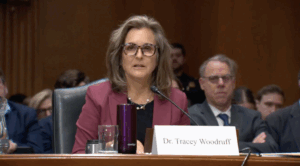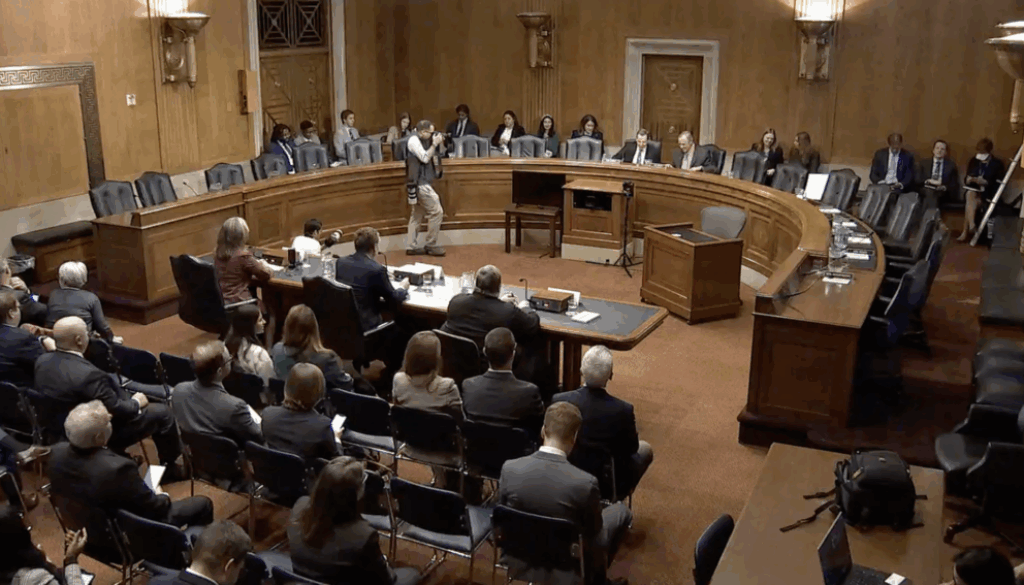Senate hearing exposes divide over chemical safety law
Listen to the audio version of this article (generated by AI).
Industry leaders and Republicans in Congress again signaled their desire to hasten federal reviews of new chemicals at a Senate hearing, while an environmental health expert warned such changes will lead to more pollution and human health impacts.
The hearing, held by the Senate Committee on Environment and Public Works on Thursday, focused on the regulation of chemicals, specifically the Toxic Substances Control Act (TSCA). TSCA is a federal law under which the US Environmental Protection Agency (EPA) evaluates chemicals to make sure human and environmental health will be protected before chemicals are allowed onto the marketplace. Industry representatives have long called for changes to the act, which was updated in 2016 with bipartisan support, saying it is unnecessarily cumbersome and that the slow review process stifles innovation.
Environmental and health advocates, however, say it is a key defense against an onslaught of toxics that people — especially vulnerable populations like pregnant women, children, workers and frontline communities near polluting industries — are routinely exposed to.

“While industry says ‘faster, faster’ and uses buzz words like ‘progress and innovation,’ it is essential that policymakers understand the repercussions of unleashing new toxic chemicals on the population,” Tracey Woodruff, director of the Program on Reproductive Health and the Environment at the University of California, San Francisco, said at the hearing.
“Once [harmful chemicals] are out there, you can’t take them back, and the result is that people get sick and die,” she said.
The other two witnesses —Gwen Gross, senior technical fellow at The Boeing Company, and Peter Huntsman, president and CEO of the Huntsman Corporation, which manufactures chemicals — argued that the TSCA review process is too slow, creating uncertainty for companies and pushing chemical innovations out of the US into other countries.
“This regulatory uncertainty and delay holds back innovation and makes it difficult to invest in technologies we desperately need … 15 to 20 years ago, the vast majority of new chemistry science came from the United States and Europe,” Huntsman said. “Today, we see China, India, Southeast Asian countries, and the Middle East region investing billions to not just match our innovation, but to exceed our capabilities.”
Huntsman also said speedier reviews are an environmental win. “The vast majority of new chemistry” is to replace older, potentially harmful chemicals, he said.
In addressing chemical review delays, Woodruff said they’re often due to staffing shortages at the EPA and companies needing to submit more data.
“Once [harmful chemicals] are out there, you can’t take them back, and the result is that people get sick and die.” -Tracey Woodruff, Program on Reproductive Health and the Environment at the University of California, San Francisco
She added that the agency has approved an estimated 3,600 chemicals over the last eight years, including “low-volume exemptions for over 600 PFAS, a class of over 15,000 chemicals so persistent they have been detected in nearly all people tested” and a jet and boat fuel chemical that has a cancer risk 250,000 times greater than the level usually considered acceptable by the EPA.
The hearing fell along partisan lines, with Republican senators agreeing with Huntsman and Gross, saying federal chemical reviews are too slow and unreliable. Several Republicans cited national security concerns resulting from chemical review delays, and said the US already has some of the most health-protective environmental regulations in the world.
“Speed matters, but predictability matters as well,” said Republican Senator Shelley Moore Capito of West Virginia, who chairs the committee.
Capito did try to find common ground on PFAS, encouraging senators across the aisle to tackle the widespread contaminants. “This problem is not going away and it hasn’t been addressed as aggressively as we can and should,” she said.
Lobbyists in charge
The hearing took place as the EPA is already proposing to remove TSCA amendments made in 2024 under the Biden administration. The proposed changes include removing the 2024 amendment that required the agency to consider every use and exposure route of a chemical when evaluating risk. Other proposed changes include scaling back how much information manufacturers need to provide for a proposed chemical; considering personal protection and safety equipment use when evaluating workplace chemical risks; and allowing the agency to determine if certain uses of a chemical carry unreasonable risks instead of making a single risk judgment based on all of the chemical’s uses. The agency is currently accepting public comments on the changes.
The EPA also keeps adding former industry lobbyists to the office that manages TSCA. Douglas Troutman, waiting for Senate confirmation to be the Office of Chemical Safety and Pollution Prevention’s assistant administrator, most recently served as an interim CEO and lobbyist at the American Cleaning Institute, an organization that represents that supply chain of cleaning products and frequently pushes back against the regulation of chemicals in the past, including TSCA.
“Speed matters, but predictability matters as well.” – Republican Senator Shelley Moore Capito of West Virginia
He will join Nancy Beck, a former chemical industry executive with the American Chemistry Council (ACC) and now the office’s principal deputy assistant administrator, and Lynn Ann Dekleva, formerly with DuPont and the ACC. The ACC calls TSCA implementation “inconsistent, unpredictable, and increasingly disconnected from real-world scenarios” and has called for an overhaul.
Woodruff said the “revolving door” between the EPA and industry is a longstanding problem across administrations and adds to the pressure on the agency to approve potentially harmful chemicals.
“With the chemical lobby pouring millions of dollars into influencing the regulatory process, we have seen troubling patterns of EPA brushing aside rigorous science showing health risks, ignoring dangerous exposures to more than half of exposed populations, and weakening rules for scientific assessments,” Woodruff said.
Democratic Senator Jeff Merkley of Oregon said TSCA was imperfect, but weakening it was not the answer.
“TSCA can be improved,” Sen. Merkley said. “But our highest priority must be to protect public health. Pollution isn’t partisan … it is our shared responsibility.”
Featured image: Screenshot, Senate Committee on Environment and Public Works hearing



